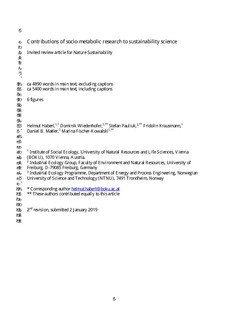Contributions of sociometabolic research to sustainability science
Haberl, Helmut; Wiedenhofer, Dominik; Pauliuk, Stefan; Krausmann, Fridolin; Mueller, Daniel Beat; Fischer-Kowalski, Marina
Journal article, Peer reviewed
Accepted version

Åpne
Permanent lenke
http://hdl.handle.net/11250/2603817Utgivelsesdato
2019Metadata
Vis full innførselSamlinger
Sammendrag
Recent high-level agreements such as the Paris Agreement and the Sustainable Development Goals aim at mitigating climate change, ecological degradation and biodiversity loss while pursuing social goals such as reducing hunger or poverty. Systemic approaches bridging natural and social sciences are required to support these agendas. The surging human use of biophysical resources (materials, energy) results from the pursuit of social and economic goals, while driving global environmental change. Sociometabolic research links the study of socioeconomic processes with biophysical processes and thus plays a pivotal role in understanding society–nature interactions. It includes a broad range of systems science approaches for measuring, analysing and modelling of biophysical stocks and flows as well as the services they provide to society. Here we outline and systematize major sociometabolic research traditions that study the biophysical basis of economic activity: urban metabolism, the multiscale integrated assessment of societal and ecosystem metabolism, biophysical economics, material and energy flow analysis, and environmentally extended input–output analysis. Examples from recent research demonstrate strengths and weaknesses of sociometabolic research. We discuss future research directions that could also help to enrich related fields.